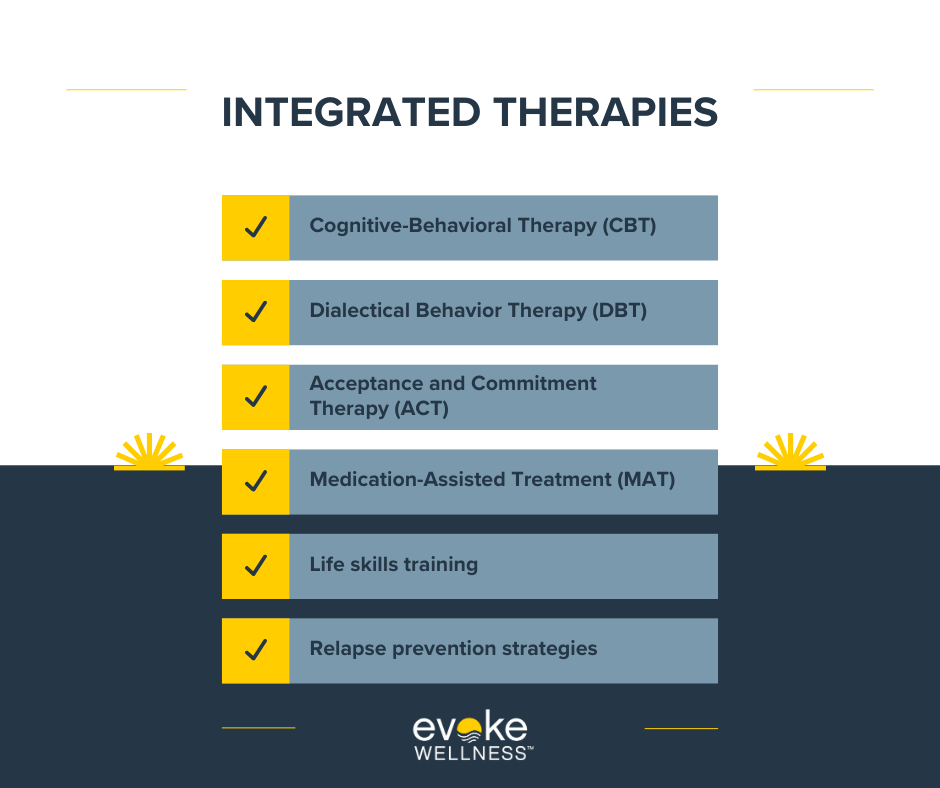You’ve faced immense challenges on your journey with addiction, but within those struggles lies the potential for profound transformation. Recent studies show that over 20 million Americans battle substance use disorders annually, yet only 10% receive treatment. At Evoke Wellness at Waltham, we understand the complexities of addiction and mental health. Our comprehensive approach integrates substance abuse treatment, mental health care, and dual diagnosis programs to address the full spectrum of your needs. Through evidence-based therapy and personalized support, you can harness your experiences to build resilience, discover inner strength, and forge a path to lasting wellness. Your journey of recovery starts here – let’s explore how you can turn adversity into your greatest asset.
Together, let’s embrace the journey to recovery and the promise of a new beginning. Call us at (833) 287-7223 today or reach out online.
Understanding the Dimensions of Wellness in Addiction Recovery
Overcoming addiction is a journey that extends far beyond just abstaining from substance use. True healing requires a holistic approach that addresses the multifaceted aspects of wellness, encompassing physical, emotional, social, intellectual, financial, occupational, environmental, and spiritual dimensions. According to Evoke Wellness, a comprehensive treatment program that integrates these dimensions can significantly enhance the recovery process and promote long-term sobriety.
Physical & Emotional Wellness
Physical wellness is a cornerstone of addiction recovery. Psychoactive drugs can profoundly impact brain function, leading to altered moods, thoughts, and behaviors. Through evidence-based therapies like Cognitive Behavioral Therapy (CBT) and Dialectical Behavior Therapy (DBT), individuals can learn to manage cravings, cope with emotional challenges, and address co-occurring mental health issues.
Emotional wellness is closely tied to physical well-being. Mindfulness practices, such as yoga and meditation, can help individuals cultivate self-awareness, regulate emotions, and develop healthy coping mechanisms.
Social & Intellectual Wellness
Social wellness plays a crucial role in recovery. Outpatient treatment programs provide a supportive community, allowing individuals to build healthy relationships and a strong support system. Group therapy sessions foster interpersonal skills, empathy, and accountability.
Intellectual wellness involves engaging in activities that stimulate the mind and promote personal growth. Educational workshops, creative pursuits, and skill-building opportunities can help individuals rediscover their passions and develop a sense of purpose beyond addiction.
Financial, Occupational & Environmental Wellness
Financial wellness is often overlooked in addiction recovery, yet it plays a vital role in maintaining stability and preventing relapse. Outpatient programs offer a cost-effective option, allowing individuals to maintain employment while receiving treatment.
Occupational wellness involves finding fulfillment in one’s work or vocation. Career counseling and vocational training can help individuals identify their strengths, set goals, and develop a sense of purpose through meaningful work.
Environmental wellness encompasses creating a safe, supportive, and trigger-free living space. Sober living environments and aftercare support groups can provide a nurturing atmosphere for sustained recovery.
Spiritual Wellness
Spiritual wellness is about finding meaning, purpose, and a connection to something greater than oneself. Holistic therapies like mindfulness, art therapy, and nutritional counseling can help individuals explore their values, beliefs, and inner strength, fostering a sense of peace and overall well-being.
By addressing these eight dimensions of wellness, individuals can embark on a transformative journey, turning challenges into strength and embracing a life of lasting recovery.
Addressing the 4 C’s of Addiction
Compulsive Behavior
At the core of addiction lies compulsion – an overwhelming, uncontrollable urge to engage in substance use or addictive behaviors. This compulsive drive overpowers the brain’s natural reward system, making it increasingly difficult for individuals to resist cravings and maintain control. Understanding this compulsive nature is crucial in addressing addiction effectively.
Cravings and Control
Intense cravings, another hallmark of addiction, often lead to a loss of control over substance use. As individuals struggle to manage these powerful urges, they may find themselves unable to abstain or moderate their consumption, even in the face of negative consequences. Breaking this cycle of cravings and lack of control is a critical step towards recovery.
Consequences of Addiction
Despite the detrimental effects on physical, emotional, and social well-being, individuals suffering from addiction often continue their substance use or addictive behaviors. This persistent engagement, despite adverse consequences, is a hallmark of the condition. Addressing the consequences and helping individuals understand the impact of their actions is essential for fostering motivation for change.
Comprehensive Treatment Approach
Overcoming addiction requires a comprehensive approach that addresses the 4 C’s holistically. Effective treatment methods combine medication-assisted therapies, behavioral interventions, and support services to counteract the brain’s adaptations and promote long-term recovery. By addressing the compulsions, cravings, loss of control, and consequences, individuals can regain their autonomy and transform their challenges into strength.
The 3 R’s: From Addiction to Recovery
Recognizing the Need for Change
Addiction is a powerful force that can take control of your life, leaving you feeling trapped and hopeless. However, the first step towards recovery is recognizing that change is necessary. According to the National Institute on Drug Abuse, nearly 1 in 10 Americans over the age of 12 struggled with substance abuse disorders in 2020. Admitting that you need help is a courageous act that can set you on a path towards healing and personal growth.
Reaching Out for Support
Once you’ve acknowledged the need for change, the next step is seeking professional support. Comprehensive addiction treatment programs, such as those offered at Evoke Wellness at Waltham, provide a range of evidence-based therapies, including EMDR (Eye Movement Desensitization and Reprocessing), cognitive-behavioral therapy (CBT), and dialectical behavior therapy (DBT). These modalities not only address substance abuse but also underlying mental health issues, trauma, and emotional dysregulation, which often contribute to addiction.
Rebuilding a Life in Recovery
Recovery is an ongoing journey, and building a fulfilling life free from addiction requires commitment and perseverance. As you progress through treatment, you’ll learn to identify and change unhealthy habits that may have previously reinforced your addiction. This could involve adopting healthier coping mechanisms, such as regular exercise, mindfulness practices, and developing a strong support network. Additionally, programs like anger management therapy can equip you with valuable emotional regulation skills, fostering healthier relationships and overall well-being.
Remember, recovery is a journey, and setbacks are a natural part of the process. However, by following the 3 R’s – recognizing the need for change, reaching out for support, and rebuilding a life in recovery – you can transform your challenges into strength and reclaim control over your life.
The Pathway of Addiction: 4 Steps to Transformation
Initiation: Curiosity and Experimentation
The path to addiction often begins with curiosity and experimentation. According to the National Institute on Drug Abuse, many factors can influence this initial stage, including environmental, biological, and social factors. For some, it may start as a way to cope with stress or peer pressure, while others may seek a thrilling experience or an escape from reality.
Regular Use: Developing Dependence
As substance use becomes more frequent, the brain’s chemistry begins to adapt, leading to a physical and psychological dependence. This stage is characterized by an intense craving for the substance and a growing tolerance, requiring higher doses to achieve the desired effect. According to a study by the Substance Abuse and Mental Health Services Administration, approximately 28.3 million Americans aged 12 or older reported using illicit drugs in 2020, highlighting the prevalence of this stage.
Addiction: Losing Control and Consequences
At this point, the individual has lost control over their substance use, and it becomes the primary focus of their life. Negative consequences, such as job loss, financial problems, strained relationships, and legal issues, become increasingly apparent. However, the individual continues to use despite these consequences, often leading to a downward spiral. According to the World Health Organization, alcohol and drug use disorders are among the leading causes of preventable death and disability worldwide.
Recovery: Committing to Wellness
The final stage is committing to a life of sobriety and wellness. This involves seeking professional help, such as substance abuse treatment programs offered by Evoke Wellness at Cohasset, which provide a comprehensive approach to recovery. Through evidence-based therapies, counseling, and support groups, individuals can develop coping mechanisms, address underlying issues, and learn to live a fulfilling life without substances. While challenging, recovery is possible, and many individuals have successfully transformed their lives by committing to this path.
Integrating Substance Abuse, Mental Health, and Dual Diagnosis Treatment
Overcoming addiction often requires a holistic approach that addresses both substance abuse and underlying mental health issues. According to a Stanford study, mental health conditions are closely linked to an increased risk of substance use disorders, highlighting the importance of integrated treatment.
Comprehensive Dual Diagnosis Care
Dual diagnosis refers to the co-occurrence of a mental health disorder and a substance use disorder. Evoke Wellness at Waltham offers a specialized dual diagnosis treatment program that addresses both conditions simultaneously through evidence-based therapies and holistic practices.
The goal is to provide comprehensive care that tackles the root causes of addiction while teaching coping mechanisms for long-term recovery.
Personalized Treatment Plans
Every individual’s journey is unique, which is why Evoke Waltham tailors treatment plans to meet specific needs. Their team of addiction specialists and mental health therapists create personalized programs that may include:
- Individual and group therapy sessions
- Family counseling and education
- Trauma-informed care
- Mindfulness and meditation practices
- Holistic therapies like art and music therapy
By addressing both the addiction and mental health aspects, individuals can build a solid foundation for lasting wellness.
Continuum of Care
Recovery is an ongoing process that requires support at every stage. Evoke Waltham offers a continuum of care, with options like intensive outpatient programs (IOPs) and night treatment programs for those balancing recovery with work or family obligations.
Aftercare planning and alumni programs also provide essential resources and community support to help maintain progress and prevent relapse. This comprehensive approach ensures individuals have the tools and guidance they need to navigate challenges and celebrate milestones along their recovery journey.
Conclusion
In conclusion, your journey from addiction to wellness is a powerful testament to human resilience. By embracing evidence-based treatments like cognitive behavioral therapy, which reduces relapse rates by up to 60%, you’re taking control of your future. Remember that recovery is a process – according to SAMHSA, about 10% of American adults are in recovery from substance use disorders. With integrated care addressing both substance abuse and mental health through dual diagnosis programs, you’re giving yourself the best chance at lasting wellness. Your challenges can indeed become your greatest strengths. As you continue on this path, know that professional support and a commitment to your own growth will be your most valuable allies in transforming your life.
Begin Your Journey with Evoke Wellness at Waltham
If you or a loved one is considering outpatient treatment, Evoke Wellness at Waltham invites you to contact us. Our compassionate team is ready to answer your questions, discuss your needs, and help you take the first steps toward recovery. At Evoke Wellness, you will find more than just a treatment program – you’ll discover a community dedicated to your wellness and success. Together, let’s embrace the journey to recovery and the promise of a new beginning. Call us at (833) 287-7223 today or reach out online.



